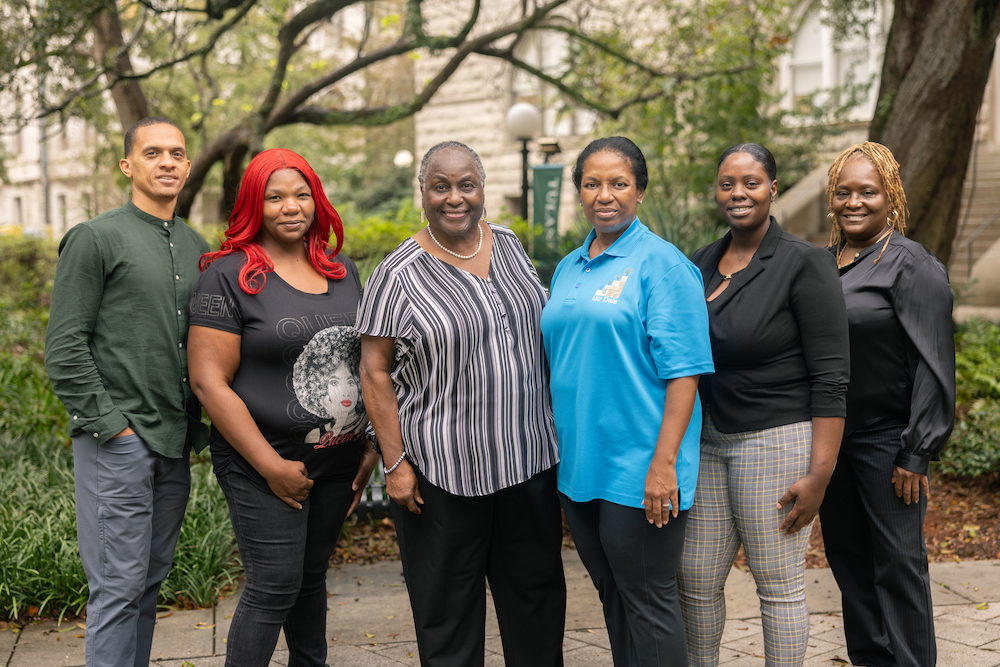Tulane professor partners with Chicago researchers to use hair-combing routine as trauma therapy
Marva Lewis, a developmental psychologist and associate professor in the Tulane School of Social Work, is an expert on parent-child relationships and child maltreatment. That expertise led her to develop an intervention that centers on the simple act of hair combing, an act she describes as an emotionally powerful, culturally valid therapeutic tool especially for families of color.
She has been researching the subject for many years, and her book, “Therapeutic Cultural Routines to Build Family Relationships: Talk, Touch and Listen While Combing Hair,” is used by mental health care professionals across the country to help families dealing with trauma and other challenges.
“Our mission is to promote everyday childcare routines as opportunities for parents to talk, touch and listen to their infant or toddler,” said Lewis, who also has clinical appointments in the School of Medicine and the Africana Studies Program in the School of Liberal Arts.
Now she is joining forces with University of Chicago Medicine (UCM) on a study that will include patients and families affected by community violence on the south side of Chicago. The study is being led by UCM, which has been awarded $600,000 from the National Child Traumatic Stress Initiative, a program of the Substance Abuse and Mental Health Services Administration. As the collaborating institution, Tulane is receiving $434,000.
Over the next five years, Lewis and her team will provide training and ongoing consultation to the social workers, psychiatrists and psychologists of UCM’s Recovery & Empowerment After Community Trauma (REACT) program. The training will be based on Lewis’s “Talk, Touch and Listen” curriculum, which explores how the daily routine of hair combing can serve as a home-based intervention that builds the emotional connections of parents to their child, culture and community.
“For infant and early childhood clinicians and researchers, the routine of a mother, father or primary caregiver combing an infant or child’s hair may serve as a clinical window into a family's intimate shared identity,” Lewis said. “This provides an opportunity for a deeper understanding of the behavioral and emotional characteristics of their growing attachment relationship.”
Tulane researchers will work with the UCM-REACT Family Advisory Board, whose members include survivors of community violence, by designing and implementing a localized version of the “Talk, Touch and Listen” approach. They will also facilitate monthly Parent Cafés, gatherings where parents can share their experiences, worries and wisdom in a safe and supportive environment.
Lewis and her staff will assist the study’s principal investigator Brad Stolbach, associate professor of pediatrics at UCM, with engaging eligible participants, analyzing data collection and contributing to the interpretation of the study’s findings.
"We'll be using this work to train the “Talk, Touch and Listen” curriculum,” Lewis said. “It focuses on parents of young children who talk about their early experiences of getting their hair combed. We help them see how their past experiences may impact their present behaviors with their child.”
Lewis said training focuses on the legacies of slavery and colorism — discrimination based on skin tone and hair type. “Many parents may not realize how these unconscious biases affect their self-image and relationships with their children,” she said.
“The hair-combing paradigm strengthens attachment,” she said. “It gives us a way to support parents in their relationships with their children. In Chicago, all of these parents will have experienced community violence in some way. We provide a safe space to talk about their trauma and what values and goals they have for their children.”
Lewis’ curriculum has been used locally by the New Orleans Women & Children’s Shelter, Healthy Start and substance abuse residential centers for women. She is also partnering with the New Orleans Early Education Network, which includes over 40 childcare centers in Greater New Orleans. She is working with similar groups in Boston and is in talks to offer the training to groups in California and Baltimore.

